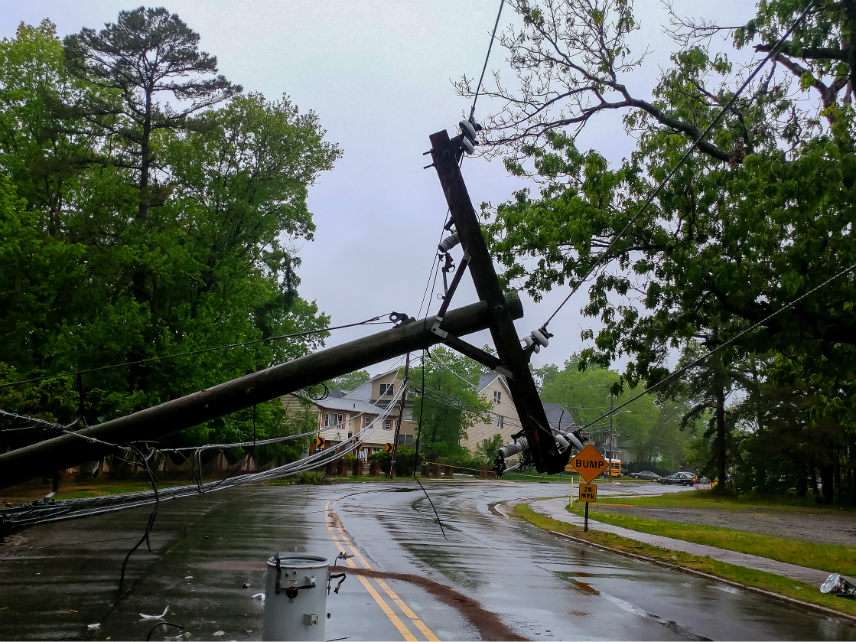Congress Bickers Over Spending $13 or $14 Billion on Disaster Relief. They Should Spend Closer to $0.
The squabbling over federal disaster assistance reveals the bipartisan nature of wasteful spending.

Two multi-billion disaster relief bills failed in Congress on Tuesday, not because they contained a lot of unnecessary spending, but because lawmakers clashed on who should get the most federal pork.
On Tuesday, a Republican-backed $13.5 billion aid package, which includes billions in assistance for agricultural, housing, and education programs, failed on a procedural vote in the Senate. This was followed by another failed Senate vote for a $14 billion Democrat-backed bill, which managed to pass the House back in January.
The squabble is primarily over how much money to spend on Puerto Rico, which was devastated by Hurricane Maria in 2017. Republicans have earmarked $600 million in nutritional assistance for the island. Democrats want hundreds of millions more to pay for drinking water infrastructure.
President Donald Trump has strongly resisted these demands, saying that the island territory has gotten enough from taxpayers.
"Puerto Rico got 91 Billion Dollars for the hurricane, more money than has ever been gotten for a hurricane before, & all their local politicians do is complain & ask for more money," tweeted the president yesterday. "The pols are grossly incompetent, spend the money foolishly or corruptly, & only take from USA."
The $91 billion claim is misleading, as it refers to the total expected payout Puerto Rico will receive from the federal government for Hurricane Maria-induced damages. Only $40 billion has been appropriated so far for the territory, of which about $11 billion has actually been spent.
The failure of the two bills yesterday sparked a war of words between lawmakers, both accusing the other side of prioritizing politics over people's lives.
Sen. Patrick Leahy (D–Vt.), the ranking Democrat on the Senate's Appropriations Committee, called Trump's opposition to disaster relief to Puerto Rico "racist" in comments to reporters. Sen. Sonny Perdue (R–Ga.) accused Democrats of using disaster victims "as pawns in their political game."
This heated bickering obscures the fact that the two bills put forward by Republicans and Democrats are incredibly similar. Indeed, both are full of needless and wasteful federal spending, says Chris Edwards, a tax policy scholar at the libertarian Cato Institute.
"The new disaster relief bill is ridiculous," Edwards tells Reason, arguing that much of the disaster relief is duplicative of other federal support programs.
For example, both Republicans and Democrats authorize $3 billion in aid to cover farmers' crop and livestock losses for a range of weather events, including 2018's hurricanes, wildfires, volcanic activity, as well as cold snaps from 2017 that damaged blueberry and peach harvests.
Farmers who purchased crop insurance can have up to 90 percent of their crop losses covered by federal aid. Farmers who neglected to purchase otherwise available insurance for their crops can get up to 70 percent of their losses covered.
"Congress just passed a $900 billion farm bill last fall that covers a lot of these same risks that farmers face," Edwards says.
He also argues that federal disaster relief effectively crowds out state, local, and private responses to natural catastrophes. Local actors have little reason to save for the inevitable flood or hurricane if they can reliably expect a big pot of federal money to be approved whenever disaster strikes. Such poor planning leaves disaster victims at the mercy of slow-moving, highly politicized, and poorly targeted federal aid.
For example, a March Government Accountability Office (GAO) report found that only a small portion had been spent of disaster recovery block grants awarded in 2017 to address that year's deadly hurricanes. Texas managed to spend only $18 million of the $5 billion awarded to it, while Puerto Rico had spent none of the $1.5 billion appropriated to it.
That GAO report blamed the ad hoc nature of the federal government's administration of these grants, which requires federal regulators to write individual rules for each grant given, and for recipients to fill out stacks of federal paper work to get access to their money—something many applicants lack the organizational capacity to do, especially following a disaster.
The goal behind all this paperwork is to prevent fraudulent claims, but as the GAO notes, the federal government still failed to adequately vet many grant applications, or prevent illegible recipients from receiving grants.
Both disaster relief bills being considered by Congress authorize an additional $1 billion in these disaster recovery block grants, along with a lot of other spending that doesn't have much to do with the immediate consequences of a disaster.
Head Start—the federal government's pre-school program—would get another $55 million from Congress' disaster relief package. A Department of Labor program that helps retrain workers laid off as the result of natural disasters would also get an additional $50 million.
There's bipartisan agreement that these line items should be in any disaster relief bill. The disagreement, ironically enough, appears to be how much to spend on Puerto Rico, the one area in the U.S. that probably is deserving of federal disaster assistance, given how poor the island is and how hard it was hit by Hurricane Maria.
The fact that disaster relief funds can easily become another political football is another argument in favor of relying more on state, local, and particularly private actors, who—from the Cajun navy to Walmart and Waffle House—often do a better job of addressing people's immediate needs.
"The federal government never used to have much of a role in natural disasters," says Edwards. "It was up to states and local governments and private charities to respond to natural disasters. That system worked pretty well."
Rent Free is a weekly newsletter from Christian Britschgi on urbanism and the fight for less regulation, more housing, more property rights, and more freedom in America's cities.


Show Comments (35)